Permaculture
Saint-Herblain (FR) – Runner-up
TEAM DATA
Team Representative: Anne-Lise Gruet (FR) – architect; Associates: Amélie Allioux (FR), François Hamon (FR) – architects; Maud Nÿs (FR) – civil engineer-architect; Anne Petit (FR) – artist
Collectif Fil, 30 Boulevard Gustave Roch, 44200 Nantes – France
+33 6 88 55 98 31 – contact.collectif.fil@gmail.com – www.collectif-fil.com
See the complete listing of portraits here
See the site page here

A. Allioux, A.-L. Gruet, A. Petit, M. Nÿs and F. Hamon
INTERVIEW
1. How did you form the team for the competition?
Four architects, members of the Collectif Fil, association of both research and action in architecture and urban planning created in January 2013, were associated to another architect who has since become a member of Collectif Fil. The Europan competition was for our team the opportunity to confront our local experiences and thoughts to the European debate supported by Europan on how to make the city through other means.
2. How do you define the main issue of your project, insisting on how you answered on this session main topic: adaptability and urban rhythms?
Facing the challenges of the site and the theme, our position was to propose a dynamic methodology based on local issues and an iterative process for a defined project yet not rigid. We propose Preux to self-rebuild by triggering several urban dynamics that would establish a logic of constant renewal.
The strength of those dynamics –we call them “processes”– lies in the fact that they do not rely on each other neither on a global urban layout, but they feed each other and overlap in a complementary way. Through four “processes” we figure out multiple answers for the district without being exhaustive. Those trigger points require to be expanded by other initiatives.
Those processes start and establish themselves by different events or even through the neighborhood everyday life and progressively face a larger scale; by the link between territory dynamics and local characteristic, and also by the confrontation of self-interests and the community. The whole methodology is about lighting up specific places to attach the neighborhood to a global urban fabric, but also refusing to presume the actual future of those places.
Considering that a city is always in progress, as a construction site, leaves it an open field to negotiations, and possible changes into large scale urban projects, that would be made possible by the life scale, toward a coherence of the community feeling.
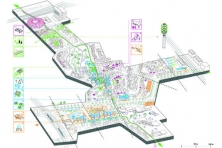
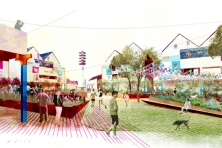
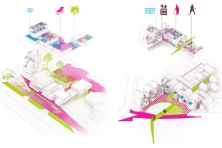
3. How did this issue and the questions raised by the site mutation meet?
The site of Preux lacks of time adaptability of ideals and devices that created it. The area has everything to work out well at first sight, yet it grew old and many links have to be tied again.This is an area of high quality, that enables the development of neighborly relations, but that gradually ended up surrounded by very large projects that exceed it.
The Permaculture methodology is thus part of the site to make the mutation become obvious. Each proposed process relies on one issue in the neighborhood and is in conversation with the identified levers of the territory. The issue is not that Preux adapts to changes around it, but that the projects around continuously feed Preux as Preux should further feed them back.
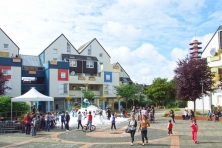
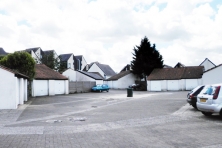
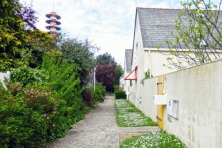
4. Have you already treated this issue previously and could you present some reference projects that inspired yours?
This issue is central to the contemporary reflections on urban planning. Collectif Fil –as an action-research association– discusses new ways of making the city on several levels –urban, architectural, design– establishing a methodology that is constantly challenged by its confrontation to the context.
The La Nizanerie project –at the origins of the Collectif– has greatly influenced our reflection on this topic. This is a project of participatory construction of the public space on the territory of the Île de Nantes, which takes the Collectif Fil on the field and forces us to take a constant step back in the production of the city.
It is a project and a place that are constantly renewed, transformed by its participants, by each of the initiatives and events encountered. It acts on the political intentions of this area of the Île de Nantes thanks to the urban dynamics that it creates. This concrete action setting of the micro scale and of the participation lead us to invent a method on a larger scale.
Furthermore, research takes a major place in the activities of Collectif Fil and many readings feed our reflection from the situationists to Rifkin, and from Christophe Hutin's "Learning from Soweto" to Heidegger’s metaphysics. The debate from the action and theoretical research between members, locals and experts is a constant source of projects. Multidisciplinary and exchanges embody the proposals.
5. Today –within the era of an economic crisis and sustainability– the urban-architectural project should reconsider its production method in time; how did you integrate this issue in your project?
This is the heart of our reflection and the reason why we created a collective.
We integrate this issue by incorporating the notion of short time in the usually long time of the urban project. Fast events on a micro scale affect the overall project on a larger scale. This allows to establish transformation processes of the city both less traumatic and less expensive, hence to minimize financial risk and provide an opportunity to question the interventions during their development. In this way, it is more acceptable to innovate because the financial risk is reduced in case of failure.
Urban planning based on large scale projects and important budgets can be completed and influenced by an “urban planning of frugality” that would praise smaller and lighter interventions to modify and adjust bigger urban projects
A sustainable project above all adapts itself to our ever-changing society
6. Is it the first time you have been awarded a prize at Europan? How could this help you in your professional career?
Yes, this was our first participation. Today, it supports the development of Collectif Fil towards an even greater professionalization and leads us to the creation of a professional project management structure, while actively protecting the part of essential research into the practice of architects and urban planners that is reduced by the economy of our professions.